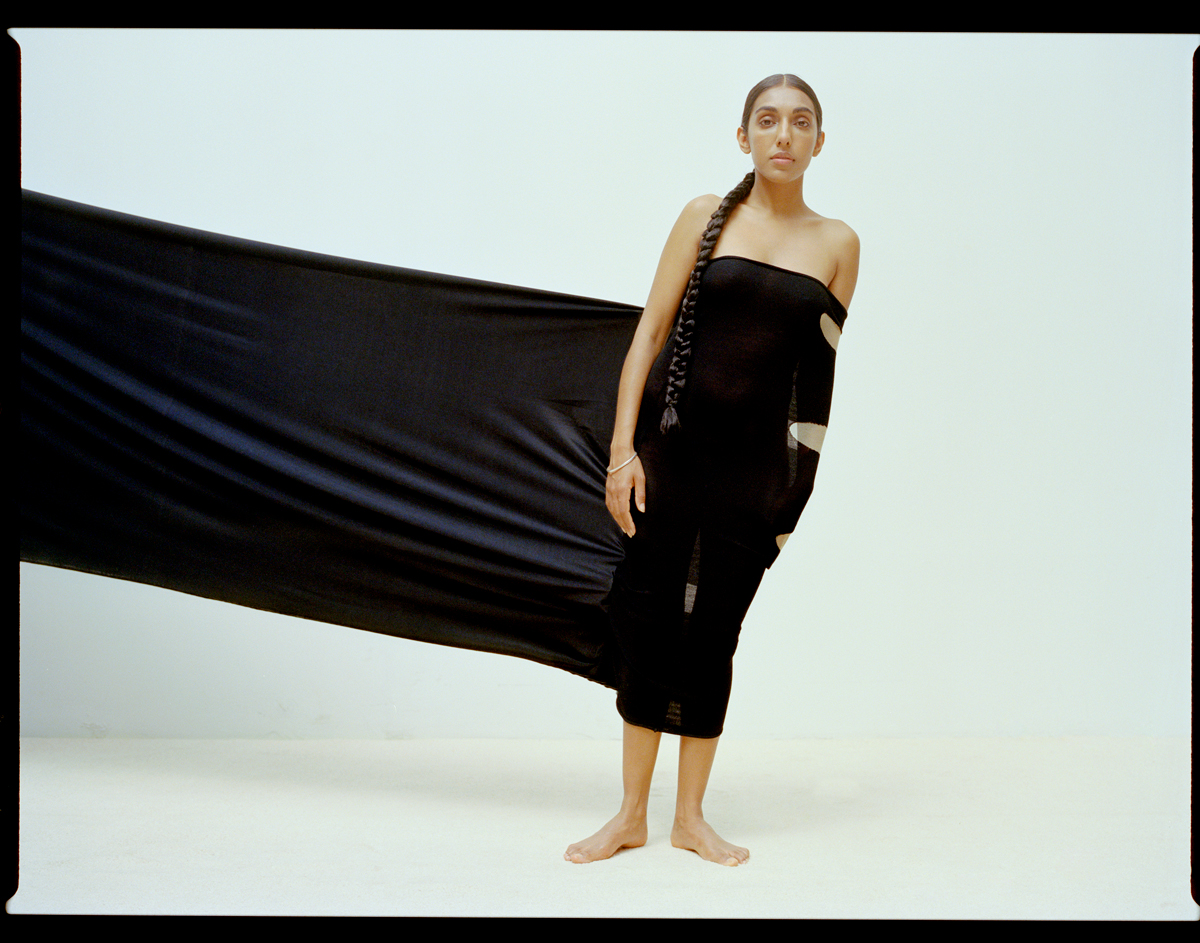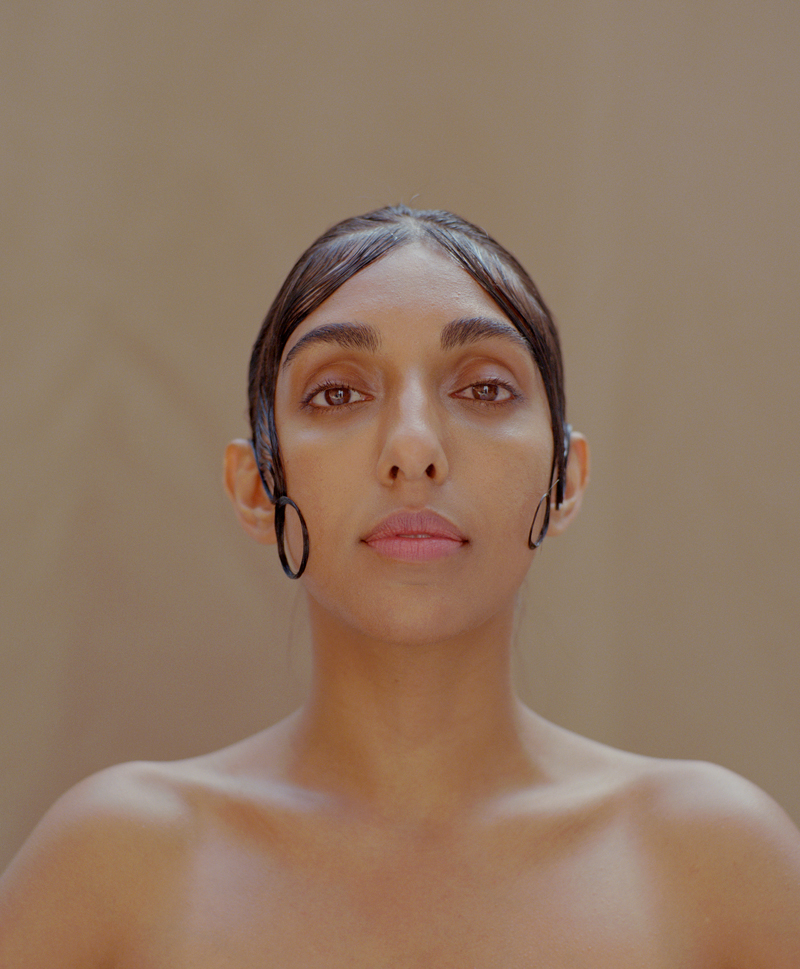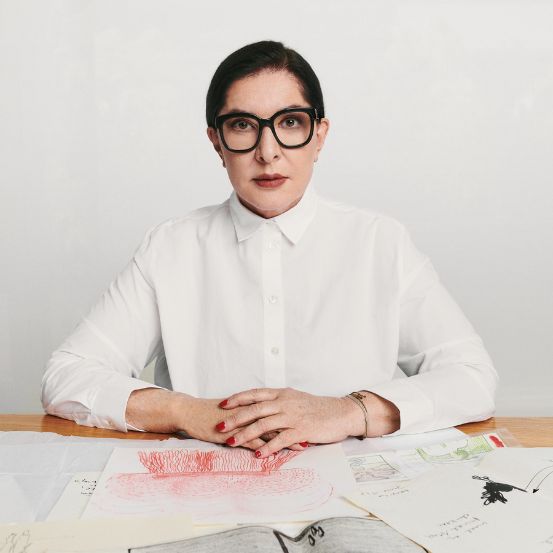When we don't have the words, Rupi Kaur writes them. When we don't have a roof, Rupi Kaur embraces us. And when we don't have the strength to be ourselves, it will be in Rupi Kaur that we will find everything we need to return to who we are.
When we don't have the words, Rupi Kaur writes them. When we don't have a roof, Rupi Kaur embraces us. And when we don't have the strength to be ourselves, it will be in Rupi Kaur that we will find everything we need to return to who we are.

Rupi Kaur ©Fotografia de Carlota Gerrerro. Realização Sina Braetz.
Rupi Kaur ©Fotografia de Carlota Gerrerro. Realização Sina Braetz.
Maybe you've heard her name. Maybe you remember it. Maybe you forgot it in the middle of so many others. Maybe you know who she is, even if you just read about her in an article about normalizing menstruation. Maybe that the image of a woman laying in bed with a red stain in her pants shocked you to your core. Maybe it made you feel empowered, understood and represented when someone shared it with you. Maybe you've seen her poems on your Instagram feed. Maybe you didn't like them. Or maybe you have read them ever since, feeling less alone because of her words.
All of this is possible because Rupi Kaur — the proud Canadian woman, the proud Punjabi Sikh immigrant, the proud daughter of an activist refugee, the proud poet and feminist — exists. All of this because Rupi Kaur — the voice, the hand and the mind behind milk and honey and the sun and her flowers, two poetry books that can be, at the same time, our best friends or worst enemies — was never silenced. All of this because Rupi Kaur — the love, the loss, the trauma, the healing, the femininity, the strenght, the roots, the heritage, the hope, the revolution — told us “and here you are living/ despite it all”.

What was your first encounter with poetry? What fascinated you the most about it?
My first encounter with poetry was probably when I was a very little girl. Poetry is something that I was constantly surrounded by while growing up. It is a large part of my faith and spirituality. Sikh scripture written in poetic verse is sung when a child is born, it is recited when someone gets married, or when they pass. And so poetry was a part of my everyday life. I learned early on that poetry is how we can explain big ideas in simple ways. There were evenings when my dad would sit around for hours, analyzing a single verse for hours. I was fascinated by how 5 words could have so much meaning. How we could dig deeper and deeper and deeper, and still there were elements left to explore.
What does poetry mean to you?
Poetry is how I move through life. Through my best and worst moments. Poetry is how I process my experiences. How I reflect. How I recover. And in the end, the poems are a result of all my reflections and lessons learned.
What, or who, inspired you to start writing poetry?
I don’t recall a specific moment that inspired me to write. I think it was more of a buildup of moments that lead me to it. Starting from a young age, I was always writing and drawing. “Expression” is my art. And poetry is my most recent medium. As a child I turned to expression because there was a lot going on at home that I didn’t know how to deal with. I couldn’t talk about these things with my parents. I didn’t have cousins or older siblings who I could spend time with. Who would make me feel seen. And so in my loneliness I turned to drawing. At the time, I didn’t have the words to describe what I was feeling. And that’s why drawing was so attractive. I didn’t need words to draw. Then years later, drawing wasn’t cutting it anymore. I needed more. That’s when I began to write small phrases in the top corners of my drawings. After years of doing that, I began to write these long poems that I would perform at open mics. And it was when I got in front of a microphone that I fell deeply and totally in love. There was no turning back after that moment. From that moment on I decided that I would challenge myself to find the words for what was bothering me. I decided it was necessary to find the words because it felt empowering.
Tell us a little bit about the design element that accompanies your poems. How did that come about, and what made you want to illustrate your poetry with drawings of your own?
What made me want to illustrate my poetry was really just the fact that I missed drawing. When I began to perform spoken word poetry and participate in poetry slams and open mics, I stopped drawing altogether. Years later, I felt guilty that I’d given up on my first love, drawing, and I wondered if there was a way for me to bring it back. I started to draw again, but it was taking time away from writing. And so I wondered if there was a way to bring the two mediums together. After racking my brain for ideas, this vision of simple line drawings, sort of fell in my lap one night. I had only ever drawn by hand, but I knew if these drawings were going to sit next to the poems they had to be digital. So I gave it a shot. In terms of design, this style worked for me because my drawings were simple enough that they didn’t distract from the words, but they were symbolic enough that they helped push the vision of the words forward. I studied rhetoric and design in university, and I think that seeped into how I designed the poems. I wanted to make something clean, clear, and concise, so that my readers could focus on the poems alone.

Do you have a favorite poem that you have written? If so, why?
I really like ‘timeless’ from the sun and her flowers and I love this one from milk and honey:
you must have known you were wrong when your fingers were dipped inside me searching for honey that would not come for you
Who are the artists that inspire you, and why?
There are so many. Sharon Olds, Marina Abromovich, Adele, Beyonce, Kahlil Gibran, Nizzar Qabbani, Amrita Sher-Gil, Frida Kahlo
You have openly talked about the fact that your father is a refugee and your experience of being seven, on the streets, protesting against female genocide. How has that shaped you, your poetry and your activism?
My dad has always been an activist. I remember him constantly dragging me to human rights protests on the weekend. Now, I’m so glad I did it, back then, at the age of 7 or 9 years old, I dreaded that I had to miss Saturday morning cartoons to stand around in the streets. He would also sign me up for speech competitions. And make me write about human rights abuses, before I even knew what human rights were. He’s a very moral and ethical person. He has always been very passionate about standing up for communities who are being oppressed, and it’s really imbued into who I am today. At the root, that’s where my poetry comes from. Activism and art are tied into one another. They are intertwined. My art has to be active for it to feel good for me.
In an interview with the amazing Emma Watson for the Our Shared Shelf Group you shared that you only wore Indian designers during your UK tour, and your background as an Indian-Canadian woman is also something that you share and explore on your Instagram, for instance. What does heritage mean to you?
Being an immigrant, I was always so confused about my identity. I was Punjabi Sikh inside the home. But when I went off to school, in Canada, everyone else was different. And my Punjabi-Sikh identity wasn’t celebrated. It was actually least celebrated by myself. I was embarrassed of being different, and not like the majority. It took me years to stop with the self-hate, and learn about why where I came from was beautiful. So, heritage means everything to me. Heritage is where I root myself. It’s where I find my truth. Where I find my people. Where I find my spirituality. And where I connect.

How was the transition from sharing your poetry on social media to publishing your first book, milk and honey? How about the process, and also growth, going from milk and honey to the sun and her flowers?
Sharing my poetry on social media was really fun. It was thrilling because I had these ideas for years, but kept them to myself. When I began sharing, my readers began to find me. We would have dialogue and conversation that would further help me grow as a person. It was my online audience who asked me for a book. So I owe a lot to my readers for their constant love and support. Publishing milk and honey was quite a journey. I look back, and I still haven’t really processed how it all happened. I can’t believe it will be 5 years this November! I feel very lucky.
Writing milk and honey was easy, because I wasn’t trying to write a book. I was just writing because I loved it. And so there was no pressure to perform. Writing the sun and her flowers was a whole different story, because suddenly “writing”, something which I loved so much, something that I did as a hobby, become my career. And so although I thought that was amazing, I didn’t realize that it would come with so much pressure. The pressure I felt to recreate the success of milk and honey left me debilitated. And so, writing the sun and her flowers was my biggest creative challenge, cause I had to overcome my own fear, self-doubt, and imposter syndrome to complete it.
The two books are also very different. milk and honey is a journey inward. It’s quite selfish and it’s quite hungry for the self. the sun and her flowers on the other hand is a journey outward. It’s stepping outside of yourself and walking out into the world. In this second book I begin to consider a lot of themes outside of me, which was fun and different.
Where did the inspiration for the poems featured in your two books come from, and what made you decide to segment them in the way you did?
The poems in my books come from my everyday life. My experiences. The experiences of the people I love, and the women around me. I write to process life, and the poems are a result of that reflection. After a few years of writing, I will look at all the work I’ve created and see what the themes are, and then segment the books accordingly. I’ll make a journey out of the different themes I’ve written about. The segmentation happens quite organically. I try not to be too logical about it. I place things where they feel good to me.

Your work has touched on issues like abuse, sexual assault, the immigrant experience and overcoming trauma. How do you navigate through the complexity of these subjects, especially when they can be so “controversial” for some people?
I just write what comes. I think that’s what makes it easy. I’m not trying to be controversial or plan out what a book is going to look like. Each day, I write what I feel, what’s honest and happening to me in that moment, because really that’s all I can do. I trust in that. My experiences have led me to write about these heavy themes, and it used to be difficult to share, but I realize it is essential for me to share, because when we share, we connect. And when we connect, we feel less alone, and can help one another recover.
How do you find the balance between writing about your own personal experiences and exploring topics that may not necessarily be autobiographical, but still speak to so many people?
When I’m not writing poetry that’s autobiographical, I tend to write about other people’s stories that have touched me deeply in some way. I am extremely sensitive and empathetic, to a fault. I can’t help but to step inside the bodies and minds of other people and process what they’re going through. It just happens. And by no means am I saying that I understand their experience. I just become deeply concerned. And I spend a lot of time contemplating their pain, admiring their resilience, and feel the need to celebrate how they have overcome life’s greatest challenges. I can spend hours, days, weeks, thinking about a single scenario.

In your own words “we need more love/ not from men/ but from ourselves/ and each other”. What does it mean for you to be a feminist, to speak up for women and to fight for women’s rights in a world that, so often, pities us against each other and makes us feel that we are not worth it?
For me, being a feminist means to uplift all those who are oppressed. To sit at the intersections, to uplift people of colour, to uplift LGBTTQQIAAP communities, people who speak different languages, are refugees, or immigrants. People who are marginalized based on their caste or socioeconomic classes. I could go on and on. But being a feminist means not staying silent. Realizing that all people deserve to be equal. Raising your voice for communities who are being crushed by greater powers. It means to listen. It means to look at myself in the mirror everyday and ask myself how I can do more, how I can do better. It means accepting that I am not perfect, and it’s actually not about being perfect at all. It’s about learning and growing every single day. About being in conversation with each other.
On Earth Day (22 of April) in 2018, you posted a poem that read “look at what they’ve done/ the earth cried to the moon/ they’ve turned me into one entire bruise”. What are your thoughts on environmental consciousness and sustainability, in this day and age?
I think our planet is in trouble. Our mother, this land that gives us breath and gives us her body as a space to live, is being abused. And we are not doing enough to change that. It terrifies me and breaks my heart. The environment may not be able to raise her voice and use language as a way to communicate. But you’re kidding yourself if you think she isn’t screaming out. Just look at the oceans. Look at the plastic that’s consuming the water. Look at the extreme weather patterns. Look at how much garbage we produce. We’re in deep trouble. And we are not doing enough to make sure that future generations have a planet to live on. And I know a lot of us care. We want to do something about it. But we may also feel like the problem is so big and beyond us that we can’t do anything about it. But that’s not true. We can’t accept that. Real change and revolution never came from the top. It never came from rich, powerful established sources . Real change and revolution has always come from the people on the ground. We can’t leave it up to the governments and companies that are profiting off of the destruction of the environment to change how they do business. They will bleed our earth dry because it makes them money. We are the only ones who can make a difference. We have to step into the idea that we, as individuals, are more powerful than we give ourselves credit for. And then we can start playing a bigger part in saving Mother Earth.
Originally published in Vogue Portugal's September 2019 issue.
For the full editorial with Rupi Kaur, published in the same issue, click here.
Most popular


Relacionados
.jpg)
Os Fashion Awards deste ano, em Londres, refletem as mudanças na indústria da Moda
03 Dec 2024


Uma viagem com a Massimo Dutti pelo universo criativo de Marina Abramović
29 Nov 2024



.jpg)